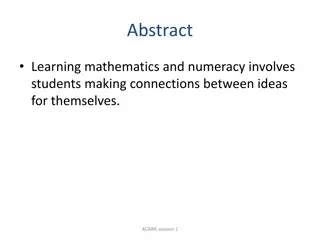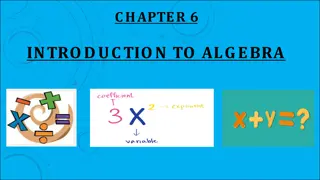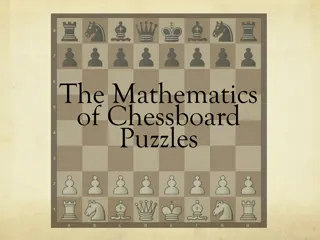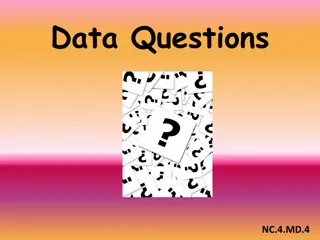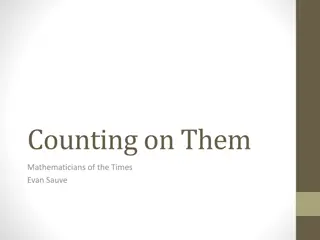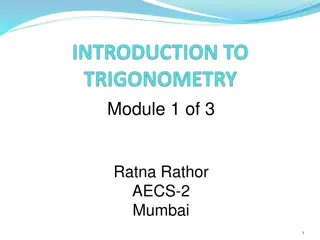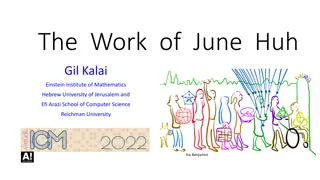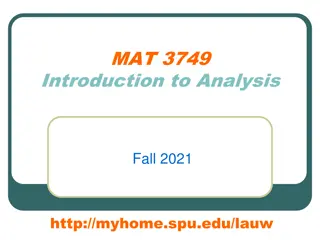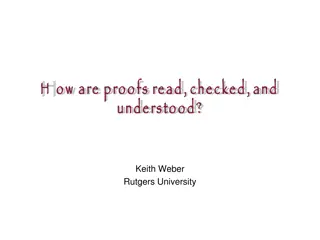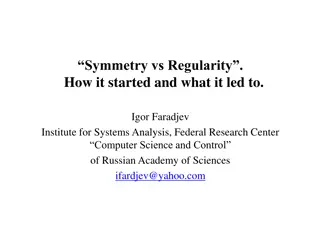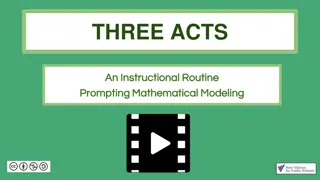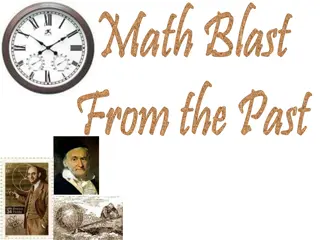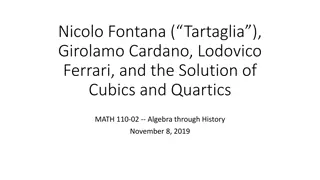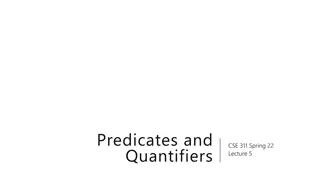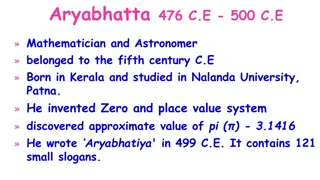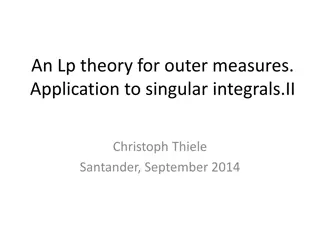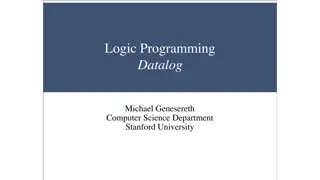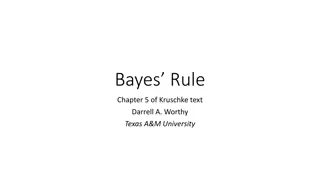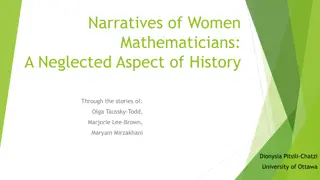Mathematicians
Explore the lives and contributions of renowned mathematicians like Pythagoras, Aristotle, Euclid, Al-Khwarizmi, Leonardo da Vinci, Galileo Galilei, De Lhopital, and Leonhard Euler. From ancient Greece to modern-day Switzerland, learn about their work in areas such as geometry, algebra, calculus, an
2 views • 10 slides
Understanding Fractions: A Brief Historical Overview
Fractions have been integral to mathematics since ancient times, with civilizations like the Greeks utilizing them in various mathematical pursuits. This article explores the concept of fractions, their representation, and usage, along with historical insights into their development by ancient mathe
3 views • 15 slides
Trailblazing Mathematicians and Innovators in Engineering
Irmgard Flügge-Lotz, a German mathematician, made significant contributions to aviation theory and engineering, paving the way for future female engineers. Nina F. Thornhill, a British innovator, focuses on sustainable operation of industrial systems. Both women have received prestigious awards and
0 views • 15 slides
Indian Contributions to Science: Yesterday, Today, and Tomorrow
Explore the rich history of Indian contributions to science, from ancient mathematicians like Aryabhatta to modern-day astronomers like Madhava. Discover the evolution of trigonometry, algebra, and astronomy in India, showcasing the brilliance of minds over the centuries.
0 views • 10 slides
Enhancing Mathematics Learning: ACARA Curriculum Session Insights
Learning mathematics and numeracy involves students making connections between ideas, aiming to develop expert mathematicians and users in various professions. The curriculum focuses on clarity and depth rather than rushing through topics, emphasizing understanding, fluency, problem-solving, and rea
0 views • 54 slides
Introduction to Algebra: Understanding the Basics and History
Algebra, a fundamental branch of mathematics, uses letters and symbols to represent numbers and quantities in equations. This chapter covers the history of algebra, from its origins in ancient Egypt to its development by mathematicians like Al-Khwarizmi and Viète. Students will learn to work with a
2 views • 45 slides
The Fascinating Mathematics Behind Knight's Tours and Chessboard Puzzles
Explore the intriguing world of Knight's tours and chessboard puzzles, from closed tours to open tours, with historical insights and mathematicians' quest for generalization beyond the standard 8x8 board. Delve into the challenges, solutions, and classifications that have captivated minds for centur
0 views • 19 slides
Understanding Categorical and Numerical Data in Mathematics
Explore the distinction between categorical and numerical data in math. Learn how mathematicians categorize and analyze data, sorting cards into different categories to understand similarities and differences. Develop perseverance skills by determining survey question types and defining data types w
0 views • 9 slides
Mathematicians Through Time: Pioneers in Mathematics
Delve into the lives and contributions of influential mathematicians throughout history, from Pythagoras and Euclid to Archimedes, Fibonacci, Descartes, and Isaac Newton. Learn about their groundbreaking discoveries, from the Pythagorean theorem to the Fibonacci sequence and the Cartesian plane, sha
8 views • 10 slides
Exploring Trigonometry: History, Applications, and Importance
Trigonometry, derived from Greek words meaning "three sides measure," is a vital mathematical discipline studying triangles' sides and angles. Delve into its historical significance, practical applications in real life, and foundational trigonometric ratios. Discover how ancient astronomers and math
0 views • 22 slides
Exploring Platonic Solids: Shapes that Define the Universe
Delve into the world of Platonic solids, five unique geometric shapes that have fascinated mathematicians and philosophers throughout history. Discover the general characteristics of each solid - Tetrahedron, Cube, Octahedron, Dodecahedron, and Icosahedron - and unravel the ancient Greeks' profound
0 views • 27 slides
Understanding Students' Epistemology on Proof in Mathematics Education
Explore the role of proof in mathematics education, focusing on how mathematicians and students approach and understand proofs. Delve into the challenges undergraduates face in justifying claims deductively and the historical shifts in investigating proof in education.
1 views • 72 slides
Insights into Graph Colorings, Chromatic Polynomials, and Conjectures in Discrete Geometry
Delve into the fascinating world of graph colorings, chromatic polynomials, and notable conjectures in discrete geometry. Explore the impact of June Huh in bringing Hodge theory to combinatorics and his proof of various mathematical conjectures. Uncover the significance of the four-color theorem, co
0 views • 17 slides
Understanding Height-Balanced Binary Trees and AVL Trees
The efficiency of tree operations like searching, insertion, and deletion is closely tied to the tree's height. Maintaining a balanced height in trees, such as AVL trees, ensures O(log2n) complexity for efficient operations. Learn about height-balanced binary trees, how to check if a tree is balance
1 views • 27 slides
Crack the Code: A Journey into Transposition Ciphers
Mathematicians play a crucial role in industries like telecommunications and internet companies by condensing data and ensuring error detection. Transposition ciphers, like the Scytale used by Romans, offer a challenging way to encrypt messages. Test your skills with code-breaking challenges and exp
0 views • 4 slides
Introduction to Polar Coordinates: A Different Coordinate System
Exploring the concept of polar coordinates, a coordinate system introduced in the mid-seventeenth century by notable mathematicians independently. Learn about measuring angles in radians, converting between degrees and radians, and drawing graphs in polar coordinates by considering length and angle
0 views • 34 slides
Understanding Analysis: Insights and Challenges in Advanced Mathematics
Dive into the world of advanced calculus and real analysis with insights from Dr. Wai W. Lau’s course at SPU. Explore the challenges and rewards of mastering calculus, the importance of multiple exposures to the subject, and the skills needed to excel in mathematical proofs. Gain valuable perspect
0 views • 31 slides
Understanding and Checking Mathematical Proofs
Reading and understanding mathematical proofs involves careful analysis of logic and reasoning. Mathematicians and students use various strategies to ensure correctness, such as examining assumptions, following step-by-step logic, and verifying conclusions. This process is crucial for grasping the v
1 views • 79 slides
Symmetry vs. Regularity: Origins of Algebraic Combinatorics
Igor Faradjev recounts the origin of algebraic combinatorics in the 1968-1990 period at the Institute for Systems Analysis. He reflects on his personal experiences, relationships with key mathematicians, and the innovative work undertaken in the Mathematical Laboratory of the Institute for Theoretic
0 views • 49 slides
Mathematical Modeling through Three Acts: A Guided Problem-Solving Approach
Explore the Three Acts instructional routine designed to prompt mathematical modeling skills. Act 1 focuses on understanding the problem, Act 2 involves planning and solving using a model, and Act 3 centers on interpreting conclusions. Engage in identifying problems, quantities, and relationships to
0 views • 19 slides
The Remarkable Life and Legacy of Mathematician Carl Friedrich Gauss
Carl Friedrich Gauss was a prodigy who made significant contributions to mathematics at a very young age. He famously solved the problem of adding numbers from 1 to 100 quickly by recognizing a pattern. Despite personal tragedies, including the loss of his first wife and child, Gauss continued to ex
0 views • 15 slides
Understanding Order of Operations in Mathematics
Order of operations is a set of rules agreed upon by mathematicians to simplify mathematical expressions and equations, ensuring consistency and avoiding confusion. By following these rules, which prioritize operations such as parentheses, exponents, multiplication, division, addition, and subtracti
0 views • 9 slides
The Renaissance Mathematician Nicolo Fontana (Tartaglia): A Tribute to Mathematical Innovations
Nicolo Fontana, also known as Tartaglia, was a significant figure in the Renaissance era, making contributions to mathematics despite facing personal challenges. His works include translations of Euclid and Archimedes into Italian, correcting errors and publishing books on various mathematical topic
0 views • 16 slides
Understanding Boolean Algebra: Predicates and Quantifiers in CSE 311 Spring '22 Lecture 5
Dive into the world of Boolean Algebra with this comprehensive guide that explores the fundamentals of predicates, quantifiers, and their applications in computer science and circuit design. Discover the concepts behind Boolean variables, logical operations, and equivalence in Propositional Logic. E
0 views • 52 slides
Aryabhatta (476 C.E. - 500 C.E.): Mathematician and Astronomer
Aryabhatta, a mathematician and astronomer from the fifth century C.E., hailed from Kerala and studied at Nalanda University. He made groundbreaking discoveries such as the invention of zero, the place value system, and an approximate value of pi. His work "Aryabhatiya" delves into astronomy, arithm
0 views • 5 slides
An Lp Theory for Outer Measures and Applications to Singular Integrals II
This content delves into the theory of outer measures, focusing on its application to singular integrals. It covers topics such as Carleson boxes, outer measures on the upper half-plane, sizes of functions on tents, outer essential supremum spaces, Lp spaces, embedding theorems, and weak L1-Sinfty e
0 views • 34 slides
Unraveling the Complexities of Hex Game Encoding Paradigms
Hex, a strategic two-player game invented by John Nash and Piet Hein, poses intriguing challenges for mathematicians and computer scientists. This article delves into different paradigms for encoding Hex game rules, exploring the performance of each. From basic observations to advanced approaches li
0 views • 20 slides
Bayes’ Rule
Bayes Rule, a fundamental concept in statistics, explores how prior beliefs are updated based on new evidence. This rule, named after Thomas Bayes, has had a profound impact on statistical inference and has been further developed by mathematicians like Laplace. Exploring the probabilistic reasoning
0 views • 34 slides
Unveiling the Untold Stories of Women Mathematicians
Delve into the narratives of Olga Taussky-Todd, Marjorie Lee-Brown, and Maryam Mirzakhani to explore the struggles, triumphs, and unique perspectives of women in the field of mathematics. These accounts challenge stereotypes, humanize the role of women mathematicians, and shed light on their journey
0 views • 7 slides
Christmaths Quiz - Fun Math Challenges for the Holidays
Engage in a Christmaths Quiz with rounds featuring math-themed challenges and trivia related to Christmas and mathematicians. Test your knowledge and skills in a festive and educational way. From matching mathematicians to creating snowflakes, there's something for everyone to enjoy during the holid
3 views • 11 slides




